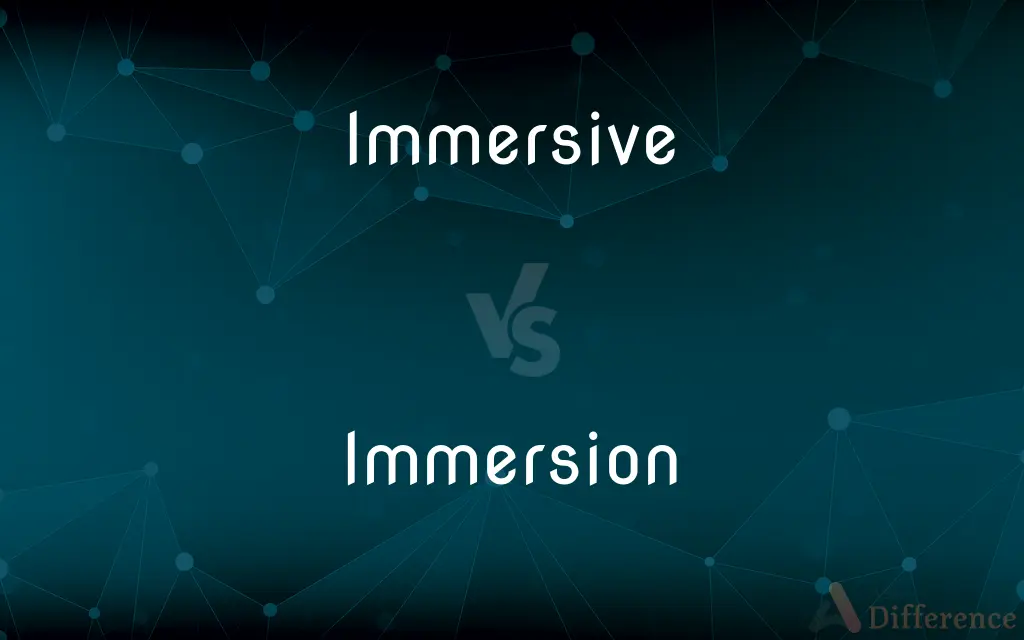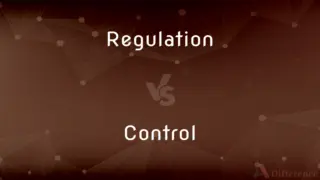Immersive vs. Immersion — What's the Difference?
Edited by Tayyaba Rehman — By Urooj Arif — Updated on March 29, 2024
Immersive technology envelops users in a virtual environment, enhancing sensory experience, while immersion refers to the depth of engagement and absorption in any activity or environment.

Difference Between Immersive and Immersion
Table of Contents
ADVERTISEMENT
Key Differences
Immersive technology is designed to create a fully enveloping virtual experience, often utilizing visual, auditory, and sometimes haptic feedback to simulate a real or imagined environment. This technology aims to make the user feel as though they are part of the digital world, using devices like VR headsets or immersive rooms. On the other hand, immersion can occur in various contexts beyond technology, such as reading a book, learning a language, or participating in a cultural exchange, where the individual's attention is fully absorbed by the activity or environment.
While immersive technology relies heavily on hardware and software to create a virtual experience, immersion as a concept focuses more on the psychological state of being deeply engaged or involved. This means that immersion can be achieved without any technological aids, depending on the individual's ability to focus and engage with the task or environment at hand.
Immersive experiences are often measured by how convincingly they can trick the senses into believing they are somewhere else. This involves a complex blend of realism and interactivity provided by the technology. Conversely, the depth of immersion in a non-technological context is influenced by personal factors such as interest, motivation, and the capacity for imaginative involvement.
The development of immersive technology is a rapidly advancing field, requiring constant innovation in software, hardware, and content creation. This evolution aims to enhance the quality and believability of the virtual environments. Immersion, however, can be influenced by improving the design of experiences or activities to make them more engaging or by educating individuals on how to more fully involve themselves in experiences.
While both immersive technology and immersion deal with the concept of being deeply engaged in an experience, they differ in their means and contexts. Immersive technology is about creating a virtual environment that stimulates the senses, whereas immersion is a broader term that refers to the depth of engagement and can apply to a wide range of experiences, both technological and non-technological.
ADVERTISEMENT
Comparison Chart
Definition
Technology that creates a fully enveloping virtual experience.
The psychological state of deep engagement with an activity or environment.
Primary Focus
Enhancing sensory experience to simulate reality.
Depth of engagement and absorption.
Dependency
Relies on hardware and software.
Can occur without technological aids.
Measurement of Success
Convincing the senses of an alternate reality.
Personal involvement and focus.
Fields of Application
VR, AR, immersive rooms, gaming.
Education, reading, cultural studies, language learning.
Compare with Definitions
Immersive
A virtual reality headset creates a fully immersive 3D environment for gaming.
Wearing the headset, she felt as though she was truly walking on Mars.
Immersion
Language immersion programs facilitate fluency through complete engagement.
After a year in the immersion program, he became fluent in French.
Immersive
360-degree videos allow viewers to look around a virtual environment.
Watching a 360-degree video, she explored the ocean floor as if she were diving.
Immersion
Deep immersion in a project can lead to innovative outcomes.
The team's immersion in the design challenge led to a breakthrough solution.
Immersive
Immersive rooms use projectors and sound systems to simulate environments.
The immersive room's jungle simulation made students feel like they were on a field trip.
Immersion
Cultural immersion helps understand societal norms and values.
Living abroad, she experienced cultural immersion, learning local customs firsthand.
Immersive
Augmented reality apps overlay digital information onto the real world.
Using an AR app, historical facts appeared next to landmarks.
Immersion
Psychological immersion in activities can improve mental health.
Painting offered her a sense of immersion, reducing stress.
Immersive
Haptic feedback gloves enhance immersion by simulating touch.
He could feel the texture of virtual objects using haptic gloves.
Immersion
Immersive reading experiences capture the reader’s full attention.
The book was so engaging, she lost track of time.
Immersive
(of a computer display or system) generating a three-dimensional image which appears to surround the user.
Immersion
The action of immersing someone or something in a liquid
His back was still raw from immersion in the icy Atlantic sea
Immersive
To cover completely in a liquid; submerge.
Immersion
Deep mental involvement in something
A week's immersion in the culinary heritage of Puglia
Immersive
To baptize by submerging in water.
Immersion
The disappearance of a celestial body in the shadow of or behind another.
Immersive
To engage wholly or deeply; absorb
Scholars who immerse themselves in their subjects.
Immersion
The act or an instance of immersing.
Immersive
Tending to immerse.
Immersion
The condition of being immersed.
Immersive
Giving the impression of immersion.
Immersion
Baptism performed by totally submerging a person in water.
Immersion
(Astronomy) The obscuring of a celestial body by another or by the shadow of another.
Immersion
The act of immersing or the condition of being immersed.
Immersion
The total submerging of a person in water as an act of baptism.
Immersion
Deep engagement in something.
Immersion
An immersion heater.
Immersion
(mathematics) A smooth map whose differential is everywhere injective, related to the mathematical concept of an embedding.
Immersion
(astronomy) The disappearance of a celestial body, by passing either behind another, as in the occultation of a star, or into its shadow, as in the eclipse of a satellite.
Immersion
(education) A form of foreign-language teaching where the language is used intensively to teach other subjects to a student.
Immersion
One's suspension of disbelief while reading, playing a video game, etc. The experience of losing oneself in a fictional world.
Immersion
The act of immersing, or the state of being immersed; a sinking within a fluid; a dipping; as, the immersion of Achilles in the Styx.
Immersion
Submersion in water for the purpose of Christian baptism, as, practiced by the Baptists.
Immersion
The state of being overhelmed or deeply absorbed; deep engagedness.
Too deep an immersion in the affairs of life.
Immersion
The dissapearance of a celestail body, by passing either behind another, as in the occultation of a star, or into its shadow, as in the eclipse of a satellite; - opposed to emersion.
Immersion
Sinking until covered completely with water
Immersion
(astronomy) the disappearance of a celestial body prior to an eclipse
Immersion
Complete attention; intense mental effort
Immersion
A form of baptism in which part or all of a person's body is submerged
Immersion
The act of wetting something by submerging it
Common Curiosities
How does immersive technology differ from traditional media?
Unlike traditional media, immersive technology provides a fully enveloping experience, often engaging multiple senses to simulate reality.
What does immersion mean in a general sense?
Immersion refers to the psychological state of being deeply engaged or absorbed in an activity or environment, regardless of the context.
What are examples of immersive technology?
Examples include virtual reality headsets, augmented reality applications, immersive rooms, and 360-degree videos.
What is immersive technology?
Immersive technology refers to devices and software designed to create a virtual environment that fully envelops the user, stimulating their senses.
What factors influence the depth of immersion?
Factors include the individual's interest, the engaging nature of the activity or technology, and the absence of distractions.
How does cultural immersion benefit individuals?
Cultural immersion helps individuals understand and appreciate different cultures, enhancing empathy and global awareness.
What is the significance of haptic feedback in immersive technology?
Haptic feedback adds a tactile dimension to virtual environments, making the experience more convincing and engaging.
Can immersion occur without technology?
Yes, immersion can occur in any setting where the individual is fully engaged, such as reading a book or learning through experience.
How do immersive rooms work?
Immersive rooms use projectors and sound systems to create an all-encompassing environment that simulates different settings or scenarios.
How do immersive experiences differ from one another?
They differ in the sensory channels they engage, the realism they offer, and their application areas, from entertainment to education.
How does immersion affect learning?
Immersion in learning, such as language immersion, can significantly enhance comprehension and retention by engaging learners fully in the subject matter.
Can immersive technology improve mental health?
Yes, immersive experiences, like those created for therapeutic purposes, can help manage conditions such as anxiety and PTSD by providing controlled, engaging environments.
What role does AR play in immersive technology?
Augmented reality (AR) enhances real-world environments by overlaying digital information, creating a unique blend of physical and virtual experiences.
Is immersion in gaming beneficial?
Immersion in gaming can enhance enjoyment and engagement, though balance is important to avoid excessive screen time.
Why is immersive technology important in education?
It provides interactive and engaging ways to learn, making complex subjects more accessible and memorable.
Share Your Discovery

Previous Comparison
Regulation vs. Control
Next Comparison
Insight vs. ForesightAuthor Spotlight
Written by
Urooj ArifUrooj is a skilled content writer at Ask Difference, known for her exceptional ability to simplify complex topics into engaging and informative content. With a passion for research and a flair for clear, concise writing, she consistently delivers articles that resonate with our diverse audience.
Edited by
Tayyaba RehmanTayyaba Rehman is a distinguished writer, currently serving as a primary contributor to askdifference.com. As a researcher in semantics and etymology, Tayyaba's passion for the complexity of languages and their distinctions has found a perfect home on the platform. Tayyaba delves into the intricacies of language, distinguishing between commonly confused words and phrases, thereby providing clarity for readers worldwide.















































